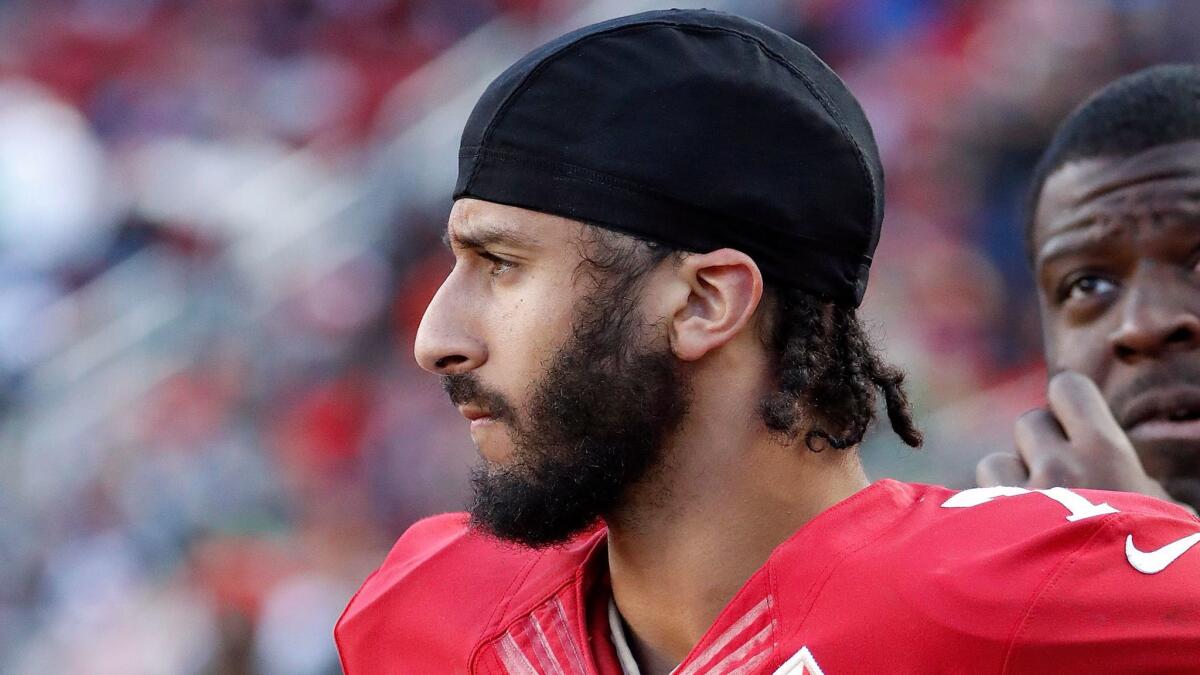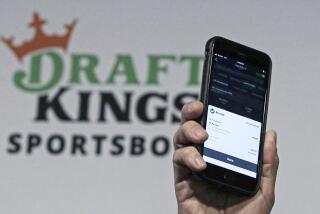Column: Colin Kaepernick certainly seems to be the victim of collusion. But can he prove it?

By any reasonable metric of professional sports, the failure of any of the 32 National Football League teams to employ quarterback Colin Kaepernick is either an indication of mass stupidity or a scandalous violation of the league’s union agreement.
Kaepernick believes it’s the latter, as is shown by his decision to file a grievance with the NFL Player’s Assn., alleging collusion by the team owners. Does he have a case? On the face of it, yes: Statistically speaking, he has capabilities equal to or better than more than a dozen quarterbacks who have started in the NFL thus far this year.
In legal terms, however, Kaepernick may be in trouble. Collusion claims such as his depend heavily on documentary evidence. Unless he has turned up a piece of paper, email, or recording in which owners have explicitly talked about keeping him unemployed or reached such an agreement implicitly, he may lose.
There are bodies in the street and people getting paid leave and getting away with murder.
— Colin Kaepernick, explaining in 2016 why he refused to stand for the national anthem
“Just because he’s empirically better doesn’t logically mean that a team would necessarily sign him over someone else,” says Michael McCann, a sports law expert at the University of New Hampshire, who has been following the issue for Sports Illustrated online. Teams can decide that the football skills of Kaepernick, who will turn 30 in about two weeks, are destined only to deteriorate from here, or that he has become such a political lightning rod that there’s no indisputable advantage in having him in the clubhouse. “Even if that’s not fair,” McCann says, “no team is obligated to sign him.”
In trying to find evidence of collusion, Kaepernick may be in the same situation as critics of Rockefeller’s Standard Oil trust, of which the pioneering muckraker Ida Tarbell wrote in 1904: “You could argue its existence from its effects, but you could never prove it.” By the same token, the decision not to employ Kaepernick could conceivably be the product of winks and nods, of implicit understandings among more than 30 millionaires and billionaires, and of the failure of their hired frontman, Commissioner Roger Goodell, to push back. The effect is plain; the proof may be elusive.
To fill in the background, as a quarterback last year for the San Francisco 49ers, Kaepernick set off a brouhaha by refusing to stand during the playing of the national anthem, starting with preseason games. His goal, he said, was to bring attention to the mistreatment of African Americans by police, including a string of killings in which police officers were let off easy or absolved of responsibility. “To me, this is bigger than football and it would be selfish on my part to look the other way,” he said. “There are bodies in the street and people getting paid leave and getting away with murder.”
Kaepernick’s action launched league-wide — indeed, nationwide — debates over the status of African Americans in American society and about political statements by sports figures. When Kaepernick’s symbolic act spread to players across the NFL this season, the league bosses struggled to come up with a policy solution that continues to elude them. Meanwhile, President Trump hectored the league from the sidelines and the owners tried to figure out if the protests, as opposed to crummy play on the field, explained an apparent decline in television ratings early in the season.
Some commentators have asserted that the players are showing disrespect to the American flag by refusing to stand for “The Star-Spangled Banner,” which is fatuous. Dallas Cowboys owner Jerry Jones, a supporter of Donald Trump, has said he’ll bench any player who doesn’t stand, which is even more fatuous and sounds like pretty good grounds for a contract grievance right there.
The situation decidedly has been not good for Kaepernick’s career. The player opted out of his contract with the 49ers in March and had some preseason workouts with the Seattle Seahawks. But he has gone unsigned despite having the ability, at least on paper, to improve the fortunes of several teams. Kaepernick led the 49ers to a berth in the 2013 Super Bowl (they lost to the Baltimore Ravens).
As Mike Tanier of Bleacher Report wrote after the NFL’s Week 1, in which mediocre and star QBs alike turned in atrocious performances, “In a league where the quarterback play is this bad, there’s no reason why Colin Kaepernick is still unemployed. No football reason, anyway…. After Sunday’s NFL action, if you claim that Kaepernick does not belong in the NFL because he is not good enough, doesn’t fit any offenses, has mechanical flaws or some other ‘football reasons,’ you are waist-deep in cow manure.”
Reportedly the final straw prompting Kaepernick to file his grievance was the Tennessee Titans’ signing of a ludicrously bad Brandon Weeden as a backup for their injured star quarterback, Marcus Mariota this month. Another opportunity may have arisen in Green Bay on Sunday, when quarterback Aaron Rodgers was knocked out for the season with a broken collarbone. The team says, however, that it will stick with its existing backup quarterbacks instead of giving Kaepernick or other unsigned players a look.
There are also grounds to speculate, however, that Kaepernick’s legal team turned up some damning evidence recently; grievances like his must be filed within 90 days of learning of an offense. Kaepernick’s attorney, Mark Geragos, didn’t respond to a request for comment.
Collusion by team owners in professional sports is certainly not new. The most notable cases have involved Major League Baseball. In 1990, the league agreed to pay $280 million to settle a raft of collusion cases that were incontrovertibly clear-cut. Those cases dated from 1985, when the owners agreed among themselves to not sign any team’s free agents. They papered over their goal by preaching “fiscal responsibility,” but the impact was inescapable: Not a single team tendered an offer to another team’s free agents.
Among the stars on whom no one bid was Kirk Gibson, a Detroit Tigers slugging star who had just turned in a career year. Gibson re-signed with the Tigers for three years. When he went back on the market in 1988, an impartial arbitrator already had found the owners guilty of collusion. Gibson signed with the Los Angeles Dodgers, and 29 years ago Sunday hit a historic home run to give the Dodgers the first game in the World Series over the Oakland A’s. The Dodgers won the Series 4-1.
But the 1980s collusion was different from what Kaepernick is alleging, McCann observes. “The baseball agreement had an effect on all the players,” he says. “That led to obvious suspicions because really good players were free agents and inexplicably weren’t of interest to other teams. It just didn’t make any sense.”
It’s easier for individual teams to justify not signing an individual player, however. “This is a more nuanced situation, where each individual team might not want Kaepernick or might not want him as much as they want someone else.”
In the MLB collusion battle, players were able to assemble witness statements and other evidence to make their case. The case also produced long-standing mistrust of the owners. Taking office as baseball commissioner in 1990, Fay Vincent lectured his bosses, “The single biggest reality you guys have to face up to is collusion. You stole $280 million from the players, and the players are unified to a man around that issue, because you got caught and many of you are still involved.”
Kaepernick may have signaled the end of his career by filing his grievance; that seems to be the conclusion reached by numerous sports pundits. But the final score hasn’t yet been posted. The grievance will go to a neutral arbitrator, who may need months to hear the evidence and issue a ruling. If he or she finds in Kaepernick’s favor, the next step would be to estimate the value of any contract he would have received and then triple it to accommodate punitive damages. Kaepernick may get his payday, but even if he loses in arbitration, his treatment has been a shame and an embarrassment for the NFL.
Keep up to date with Michael Hiltzik. Follow @hiltzikm on Twitter, see his Facebook page, or email [email protected].
Return to Michael Hiltzik’s blog.
More to Read
Go beyond the scoreboard
Get the latest on L.A.'s teams in the daily Sports Report newsletter.
You may occasionally receive promotional content from the Los Angeles Times.











